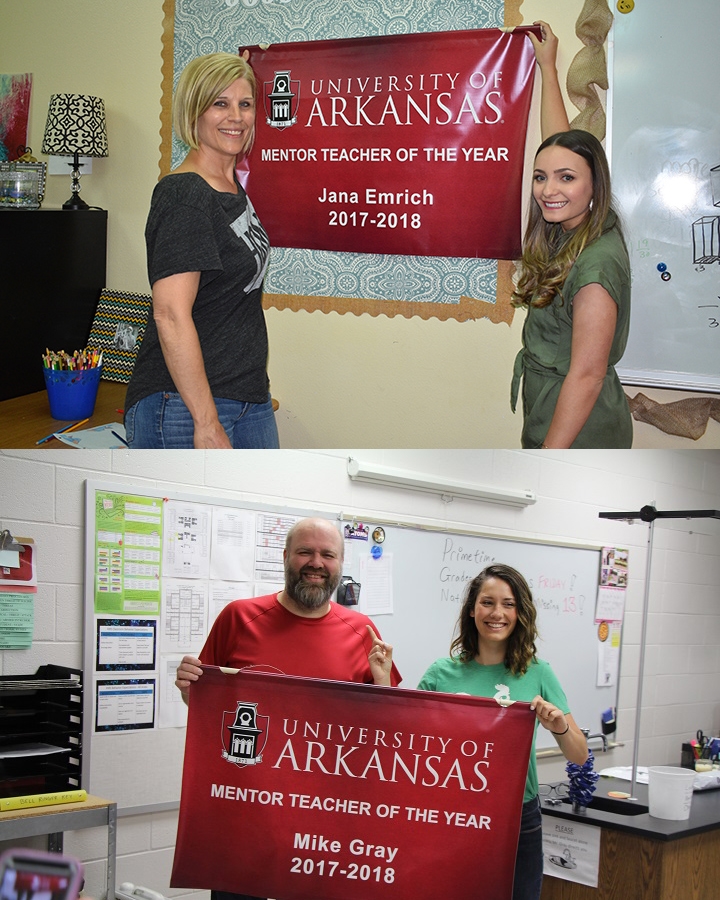
Two University of Arkansas teacher-education students visited their former mentor teachers' classrooms recently — to hang banners announcing Mentor Teacher of the Year honors for Jana Emrich and Mike Gray.
Landie Lee nominated Emrich, a fifth-grade teacher at Ruth Barker Middle School in Bentonville, and Moriah Santiago nominated Gray, a seventh-grade science teacher at J.O. Kelly Middle School in Springdale, for the awards presented by the Office of Teacher Education at the U of A.
Emrich said she was overwhelmed when Lee presented the banner to her at school in front of her class.
"I was very nervous because this was the first time I've had a student intern," Emrich said. "But Landie was awesome. I'm slated to have another intern this fall."
This was Gray's first time to mentor as well. He said he was fortunate in that Santiago "is an amazing new teacher. She came in with the right training and the right attitude. She immediately wanted to create relationships with the students, and that opened up doors to her being able to teach very well. ... They grew to love her, and they miss her when she's not here."
Lee graduated May 12 with a bachelor of science degree in elementary education, and Santiago graduated with a master of arts in teaching in science education.
The degree programs in the College of Education and Health Professions includes full-time internships, and mentor teachers are vital to the success of the experience. The Office of Teacher Education has presented the awards for several years. The office places more than 1,000 students for teaching internships in nearly 20 school districts each year.
Lee said Emrich both creates a positive learning environment for her students and establishes professional relationships with her peers.
"She integrates literacy and economics into her curriculum to provide real-life experiences for her students and makes learning memorable and authentic," Lee said. "All of her lessons and instruction provide meaningful and engaging material that students can apply to their everyday life."
Lee also described learning from Emrich how to use differentiation in the classroom to meet all students' needs at their level of readiness. She also saw the effect of Emrich's classroom management style on her students.
"Students know that it's OK to make mistakes in Mrs. Emrich's classroom and she has established a growth mindset for her students," Lee said.
Emrich not only positively affected her development as a teacher, Lee said, but also inspired her to become a better person. She worked with Lee after school, showed Lee a variety of ways she could explain concepts to students and provided effective feedback after every lesson Lee taught.
"What I admired about Mrs. Emrich was that she always encouraged me to try different lessons from hers to see what worked best for me," Lee said. "Before internship, I felt nervous and unsure if I was capable of teaching a classroom of 28 students by myself. Mrs. Emrich gave me so much ease during internship and made me feel confident as a teacher and helped guide me to be the best teacher that I could be."
Santiago said Gray has built relationships with his students based on mutual respect, and many refer to him as their "school dad" because he is interested in their well-being as people, not just students. He starts each day by reciting with the students that "every day is a big day!"
"This instills a sense of personal responsibility within students to create their own purpose," she said. "Mr. Gray makes his classroom a fun, friendly environment. He allows students to be their silly selves while staying on task; he takes their off-the-wall musings and questions and redirects them into teachable moments."
Gray often asked Santiago what she was learning in class and encouraged her to try out new techniques with the students. He also informed assistant principals, instructional facilitators and other science teachers about Santiago's work, opening doors for her to have conversations with school administrators.
"He gives his all to his profession and the people around him," Santiago said. "He is impeccably organized; just by being in the classroom with him a few months I have learned so much in how to create important organizational habits in the classroom to stay on top of the workload."
Gray explains to his students that standardized tests are important in earning scholarships to college, Santiago said.
"He then goes on to provide numerous examples of students who have been through his class, just like the ones listening to him today, and their success stories of getting scholarships due to high test scores," she said. "Mr. Gray will then go on to introduce these alumni of his class to his current students so they can physically speak to someone who has been in their shoes and how focusing in school has gotten them money for college."
After the brief ceremony, Gray showed how he incorporates the importance of education into his integrative science classroom. He had attended Santiago's graduation and had ready to show the 12- and 13-year-olds its commencement program with her name highlighted: "You always have to keep your eyes up, keep their vision forward, they can do it, too. She did it, they can, too."
Topics
Contacts
Ben Pollock, digital media specialist
College of Education and Health Professions
479-575-4554,
Heidi Wells, director of communications
College of Education and Health Professions
479-575-3138,